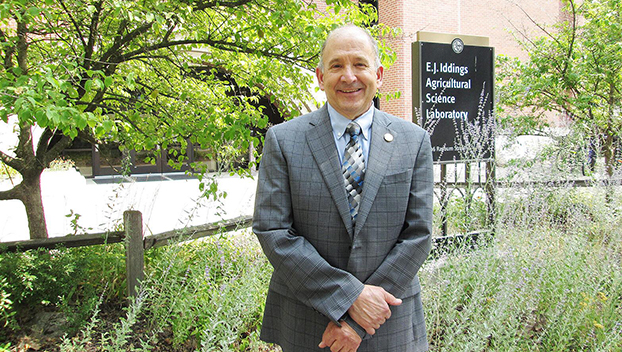Private Treaty February 2025
Pacific Cattle Angus, Sim-Angus, and Simmental range-raised production fall bulls available by PRIVATE TREATY FEBRUARY 2025 Carl Wisse • carl@pacificcattle.com www.pacificcattle.com • 509-539-6850 • Eltopia, WA
Published 7:55 am Thursday, January 23, 2025

Leaders of the University of Idaho agricultural extension system will ask the legislature for money to hire a Parma Research and Extension Center-based professor who specializes in viticulture and small fruits.
UI’s Agricultural Research and Extension Service also will ask lawmakers to cover a portion of building maintenance costs associated with the dairy-anchored Idaho Center for Agriculture, Food and Environment (CAFE) under development near Rupert.
Both requests aim to build on the facilities’ strong momentum driven by industry, state leaders, faculty and others, UI College of Agricultural and Life Sciences dean Michael Parrella said.
Parma-area agriculture stakeholders meeting in 2017 to discuss the future of the R&E center — eyed for closure during the late 2000s recession — identified a need to serve the state’s growing wine industry, he said.
The lab-centered Idaho Center for Plant and Soil Health opened just over a year ago at Parma, and “we’re equipped to follow through on that request,” Parrella said.
Idaho lacks a university researcher focused on viticulture. UI seeks an ongoing $157,900 from the state general fund for the viticulture and small fruit specialist, according to a budget request — which also said the state wine commission, growers and winemakers “have all expressed a need for further applied research to support industry needs.”
The researcher and educator, who would share space in the pomology lab, would help established and incoming producers in areas such as variety and site selection, vineyard best practices, and managing pests and diseases, Parrella said.
“For example, a California group wants to come in. Where should they go? What grapes can they grow,” he said.
The need to bring in experts from other states would be greatly reduced, Parrella said. And further growing the state’s wine industry offers potential environmental as well as economic benefits, as grapes are a relatively low water user.
Small fruits are increasingly important, Parrella said. Berries are growing as an industry, and more homeowners are growing vines and fruit trees.
As urban areas develop, “with that comes the need for a greater college focus on urban agriculture,” he said.
CAFE, on 640 acres, is slated to be completed next year. It will include a milking parlor, specialized barns, corrals and shade structures, a manure and nutrient management facility, research lagoons, and classroom and office space. The $45 million project includes industry, state and federal funding.
The general fund budget request is for half of phase-one building maintenance costs — $250,100 including a part-time position. The first phase comprises the milking parlor, computer hardware and software, and site work, Parrella said.
For various projects, “we are limited as to what we can ask for” each year, he said. Operation of sizable new projects typically is funded from year to year as needs develop.
Enhancements are limited to 3% of ARES’ proposed $39.1 million budget for the July 1 fiscal year, or just over $1.1 million. About $500,000 is left after personnel and other costs.